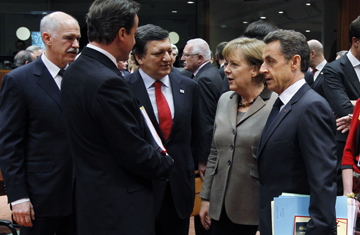
Greek Prime Minister Georges Papandreou, Britain's Prime Minister David Cameron, European Commission President Jose Manuel Barroso, German Chancellor Angela Merkel and France's President Nicolas Sarkozy take part in an European Union extraordinary leaders summit on Libya and North Africa, in Brussels March 11, 2011.
European leaders have struggled to find a collective voice since the uprisings began in North Africa two months ago, but at a Brussels summit on Friday they articulated a rare and robust message of unity in the face of a defiant Muammar Gaddafi. With the Libyan strongman cranking up his attacks against rebels, the European Union delivered an unequivocal call for him to depart as soon as possible so the country can begin a peaceful transition of power. "European leaders were united, categorical and crystal clear: Gaddafi must go," British Prime Minister David Cameron said. "We demand Gaddafi's immediate resignation," echoed German Chancellor Angela Merkel. "The problem has a name: Gaddafi," said European Commission President José Manuel Barroso. "He must go."
But making bold statements is easy. The tricky bit is working out what to do if, as seems likely, Gaddafi doesn't get the memo. European leaders agreed to consider military action if backed by the Arab League and United Nations, but most are wary of getting their own hands dirty. And when it comes to the next step, Europe is as divided as ever.
Some, like French President Nicolas Sarkozy, think Europe needs to move fast. He has already recognized the Libyan rebel leadership, the National Libyan Council, as the country's legitimate government, and now he wants his fellow leaders to agree to a no-fly zone over the country. Sarkozy even talked about "defensive" air strikes against the regime, saying they should be launched in the event Gaddafi uses chemical weapons or unleashes airpower against unarmed demonstrators.
Sarkozy has partial backing from Cameron, and the two leaders wrote a joint letter on Thursday calling on NATO to draw up plans for "a no-fly zone or other options against air attacks" by Gaddafi. French officials said those other options could include bombing Gaddafi's runways to prevent his aircraft from taking off. But even as Cameron was taking a stand with Sarkozy, British officials quietly distanced themselves from the French President's remarks about air strikes. And when E.U. foreign ministers met on Thursday to prep for Friday's summit, France found no one to support its move to recognize the Libyan opposition.
Indeed, most E.U. leaders warned that intervention was fraught with risk. Merkel said she was "fundamentally skeptical" about military action in general and no-fly zones in particular, adding that there is currently no legal basis for such measures. Her foreign minister, Guido Westerwelle, warned that such an operation could easily escalate. "A no-fly zone is not putting up a traffic sign, but intervening with bombs, rockets, weapons," he said. "If it doesn't work, do we go further, with land forces?" Belgian Prime Minister Yves Leterme bluntly declared that military action would only be possible with the blessing of the U.N. and a request from governments in the Mediterranean region.
Even NATO defense ministers, who were also meeting in Brussels on Thursday, rejected a no-fly zone, agreeing only to reposition warships in the region and plan for humanitarian aid. NATO Secretary General Anders Fogh Rasmussen and U.S. Defense Secretary Robert Gates both made clear that NATO would agree to a no-fly zone only with "a clear legal basis" from the U.N.
That might be hard to get, as Russia is against the idea, China is reluctant and Brazil appears unconvinced. But E.U. officials said they were receiving strong signals from Libya's neighbors that they think a no-fly zone is necessary. And perhaps the most significant outcome of the Brussels meeting on Friday was a call for a special summit on the issue with the Arab League and the African Union to discuss the unfolding situation in Libya.
Yet the focus on military action obscures the fact that the E.U. has moved remarkably swiftly and forcefully against Gaddafi in other areas. Going beyond the U.N. measures, the E.U. has frozen the assets of 26 Libyans including members of the Gaddafi family, slapped a visa ban against them too, and extended sanctions to include the $70 billion Libyan Investment Authority, which manages Libyan oil.
And the E.U. is already mulling a longer-term strategy to overhaul it's so-called "neighborhood policy," which has failed in its aim to prod the Mediterranean region's regimes towards openness and democracy. On March 9, the European Commission unveiled a new stick-and-carrot policy proposal that said those Arab nations who strongly embrace moves towards democracy will get more European aid. Officials say that the European Investment Bank could provide around $7 billion to some of its Arab neighbors in the coming three years.
Charles Grant, director of the London-based Center for European Reform, says this is a chance for the E.U. to offer parts of the Arab world more money, markets and mobility — but to tie those benefits to progress on democracy and human rights. "If the E.U wants to influence its neighbors it will need to increase its offer to them," he says. "What should be clear in the new neighborhood policy, however, is that only countries which reform their political systems will enjoy the closest relations with the E.U."
But these are not policies that can be put into action overnight, and the Brussels summit on Friday underlined once again how slowly the E.U. usually moves. British Prime Minister Cameron, who had sought stronger language on no-fly zones, insisted that for all its divisions, the E.U. had moved forward. "I think it is progress," he said. "But sometimes progress can take some time when you're having 27 conversations around the table."
